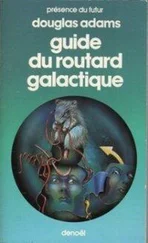Douglas Adams - Last chance to see
Здесь есть возможность читать онлайн «Douglas Adams - Last chance to see» весь текст электронной книги совершенно бесплатно (целиком полную версию без сокращений). В некоторых случаях можно слушать аудио, скачать через торрент в формате fb2 и присутствует краткое содержание. Жанр: Фантастика и фэнтези, на английском языке. Описание произведения, (предисловие) а так же отзывы посетителей доступны на портале библиотеки ЛибКат.
- Название:Last chance to see
- Автор:
- Жанр:
- Год:неизвестен
- ISBN:нет данных
- Рейтинг книги:5 / 5. Голосов: 1
-
Избранное:Добавить в избранное
- Отзывы:
-
Ваша оценка:
- 100
- 1
- 2
- 3
- 4
- 5
Last chance to see: краткое содержание, описание и аннотация
Предлагаем к чтению аннотацию, описание, краткое содержание или предисловие (зависит от того, что написал сам автор книги «Last chance to see»). Если вы не нашли необходимую информацию о книге — напишите в комментариях, мы постараемся отыскать её.
Last chance to see — читать онлайн бесплатно полную книгу (весь текст) целиком
Ниже представлен текст книги, разбитый по страницам. Система сохранения места последней прочитанной страницы, позволяет с удобством читать онлайн бесплатно книгу «Last chance to see», без необходимости каждый раз заново искать на чём Вы остановились. Поставьте закладку, и сможете в любой момент перейти на страницу, на которой закончили чтение.
Интервал:
Закладка:
It's not that they're not willing. When they are in breeding condition, their sex drive is extremely strong. One female kakapo is known to have walked twenty miles in one night to visit a mate, and then walked back again in the morning. Unfortunately, however, the period during which the female is prepared to behave like this is rather short. As if things aren't difficult enough already, the female can only come into breeding condition when a particular plant, the podocarp for instance, is bearing fruit. This only happens every two years. Until it does, the male can boom all he likes, it won't do him any good. The kakapo's pernickety dietary requirements are a whole other area of exasperating difficulty. It makes me tired just to think of them, so I think we'll pass quickly over all that. Imagine being an airline steward trying to serve meals to a plane full of Moslems, Jews, vegetarians, vegans and diabetics when all you've got is turkey because it's Christmas time, and that will give you the idea.
The males therefore get extremely overwrought sitting in their bowls making noises for months on end, waiting for their mates who are waiting for a particular type of tree to fruit. When one of the rangers who was working in an area where kakapos were booming happened to leave his hat on the ground, he came back later to find a kakapo attempting to ravish it. On another occasion the discovery of some ruffled possum fur in the mating area suggested that a kakapo had made another alarming mistake, an experience which is unlikely to have been satisfying to either party.
The net result of all these months of excavating and booming and walking and scrarking and being fussy about fruit is that once every three or four years the female kakapo lays one single egg which promptly gets eaten by a stoat.
So the big question is: How on earth has the kakapo managed to last this long?
Speaking as a non-zoologist confronted with this bird I couldn't help but wonder if nature, freed from the constraints of having to produce something that would survive a great deal of competition, wasn't simply making it up as it went along. Doodling in fact. 'How about sticking this bit in? Can't do any harm, might be quite entertaining.'
In fact the kakapo is a bird that in some ways reminds me of the British motorbike industry. It had things its own way for so long that it simply became eccentric. The motorbike industry didn't respond to market forces because it wasn't particularly aware of them. It built a certain number of motorbikes and a certain number of people bought them and that was that. It didn't seem to matter much that they were noisy, complicated to maintain, sprayed oil all over the place and had their own very special way, as T.E. Lawrence discovered at the end of his life, of going round corners. That was what motorbikes did, and if you wanted a motorbike, that was what you got. End of story. And, of course, it very nearly was the end of the story for the British industry when the Japanese suddenly got the idea that motorbikes didn't have to be that way. They could be sleek, they could be clean, they could be reliable and well-behaved. Maybe then a whole new world of people would buy them, not just those whose idea of fun was spending Sunday afternoon in the shed with an oily rag, or marching on Aqaba.
These highly competitive machines arrived in the British Isles (again, it's island species that have never learnt to compete hard. I know that Japan is a bunch of islands too but for the purposes of this analogy I'm cheerfully going to ignore the fact) and British motorbikes almost died out overnight.
Almost, but not quite. They were kept alive by a bunch of enthusiasts who felt that though ,the Nortons and Triumphs might be difficult and curmudgeonly beasts, they had guts and immense character and the world would be a much poorer place without them. They have been through a lot of difficult changes in the last decade or so but have now re-emerged, re-engineered as highly prized, bike-lovers' bikes. I think this analogy is now in serious danger of breaking down, so perhaps I had better abandon it.
A few days earlier I had had a dream. I dreamt that I awoke to find myself lying on a remote beach spreadeagled on huge round pink and pale blue boulders and unable to move, my head filled with the slow roar of the sea. I awoke from this dream to find myself lying spreadeagled on huge round pink and pale blue boulders on a beach and dazed with confusion. I couldn't move because my camera bag was slung around my neck and jammed behind a boulder.
I struggled to my feet and looked out to sea, trying to work out where on earth I was and if I was still embroiled in a recursion of dreams. Perhaps I was still on a plane going somewhere and was just watching an in-flight movie. I looked around for a stewardess but there was no one coming along the beach with a tray of drinks. I looked down at my boots and that seemed to trigger something in my head. The last clear memory that came to mind of looking closely at my boots was after emerging from a bog in Zaire when they were sodden with African mud. I looked around nervously. There were no rhinoceroses on the beach either. The beach was clearly not in Zaire because Zaire is landlocked and doesn't have them. I looked at my boots again. They seemed oddly clean. How had that happened? I remembered someone taking my boots away from me and cleaning them. Why would anyone do that? And who? An airport came swimming back to me and I remembered being questioned about my boots and where I had been with them. Zaire, I said. They took my boots away and returned them to me a few minutes later spotlessly clean and glistening with disinfectant. I remembered thinking at the time that any time I wanted to have my boots really cleaned properly I should remember to fly to New Zealand again. New Zealand. They were quite naturally paranoiac about any foreign bacteria being imported into one of the most isolated and unspoilt countries in the world. I tried to remember flying out of New Zealand and couldn't. Therefore, I must still be in New Zealand. Good. I'd narrowed it down a bit. But where?
I stumbled a little woozily up the beach, clambering over the boulders of quietly hallucinatory colours, and then from my new vantage point saw Mark away in the distance on his knees and peering into an old log.
'Moulting little blue penguin,' he said when at last I reached him.
`What? I said. 'Where?
'In the log,' he said. 'Look.'
I peered into the log. A small pair of black eyes peered anxiously back at me from out of a dark ball of ruffled blue fluff.
I sat back heavily on a rock.
'Very nice,' I said. 'Where are we?
Mark grinned. 'I thought you seemed a bit jet-lagged,' he said. 'You've been asleep for about twenty minutes.'
'OK,' I said, irritably, 'but where are we? I think I've narrowed it down to New Zealand.'
'Little Barrier Island,' he said. 'Remember? We came here this morning by helicopter.'
'Ah,' l said, 'so that answers my next question. It's the afternoon, yes?
'Yes,' said Mark. 'It's about four o'clock and we are expected for tea.'
I looked up and down the beach again, thunderstruck by this idea.'
'Tea?' I said.
°With Mike and Dobby.'
'Well just pretend you know them when we get there because you spent an hour chatting to them this morning.'
'I did?
'Dobby is the warden of the island.'
`And Mike??
'His wife.'
'I see.' I thought for a bit. 'I know,' I said, suddenly. 'We've come to look for the kakapo. Yes?
'Correct.'
`Will we find one here?'
'Doubt it.'
`Then remind me. Why are we here?
'Because this is one of the only two places where there are definitely kakapos living.'
'But we probably won't find one.'
No.
`But we will at least get some tea.'
Читать дальшеИнтервал:
Закладка:
Похожие книги на «Last chance to see»
Представляем Вашему вниманию похожие книги на «Last chance to see» списком для выбора. Мы отобрали схожую по названию и смыслу литературу в надежде предоставить читателям больше вариантов отыскать новые, интересные, ещё непрочитанные произведения.
Обсуждение, отзывы о книге «Last chance to see» и просто собственные мнения читателей. Оставьте ваши комментарии, напишите, что Вы думаете о произведении, его смысле или главных героях. Укажите что конкретно понравилось, а что нет, и почему Вы так считаете.







